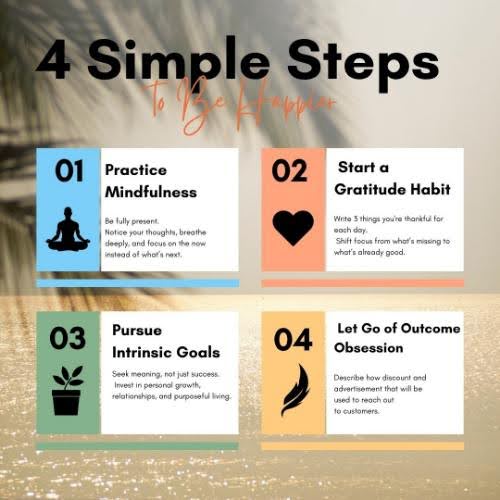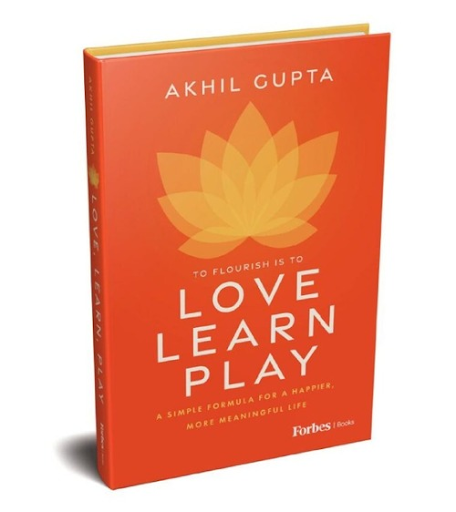Key Takeaways
- Chasing Happiness Creates a Cycle of Dissatisfaction. Tying joy to goals or possessions brings only short-term highs and keeps us stuck in a loop of wanting more.
- Being Happy Is a Present-Moment Choice. True happiness starts with choosing contentment now, not later, regardless of external circumstances.
- Mindfulness and Gratitude Foster Lasting Joy. Daily practices like reflection, presence, and appreciation build emotional strength and deeper fulfillment.
- Inner Peace Outweighs Outer Success. Real happiness comes from within, not from status, wealth, or validation. UEF supports this shift with tools for conscious, spiritually grounded living.
Table of Contents
Introduction: The Modern Happiness Dilemma
The Psychology Behind The Happiness Chase:
Being Happy: What Research Says Works
Real-Life Scenarios: Chase vs. Presence
How to Be Happier Without Chasing It
Conclusion: Choose Presence Over Pursuit
Introduction: The Modern Happiness Dilemma
Do you ever tell yourself, “I will be so happy once I have over 1M followers.” Or “I’ll be complete once I find a like-minded partner.” Or “When I buy the next luxury car, I’ll finally arrive in life.” Or, do you feel that happiness is not something you can catch at the end of a finish line? You believe in enjoying the process rather than stressing over the outcome.
These questions or thoughts are pertinent and in many ways a reflection of our modern-day society, where each of us is chasing our own versions of happiness and attaching it to goals, possessions, people, future events and so on, with a belief that accomplishing them would give us eternal happiness.
If you are caught in this dilemma and looking for ways to understand the difference between chasing happiness and being happy, continue to read as we unravel this mystical world.
Defining The Concepts
In our incessant pursuit of discovering how to be happier in life, we now seem to be caught in a self-made web of modern pressures and desires, unable to untangle ourselves from the choices we have made. Let’s take a closer look.
- Chasing Happiness
We tend to burden ourselves by attaching happiness to outcomes, ‘if I become this… I will be happier if he or she marries me, my life will be complete; If I get this promotion, all my worries will fade away,” And we keep adding to the list with the hope that once we accomplish them, fulfilment will automatically follow. Thus, getting caught in this endless happiness chase of desires.
- Being Happy:
We still wonder how to be happy. Happiness begins with an underlying decision: do we want to be happy or not? It is really that simple, and once we make that choice of happiness, our flourishing life journey of ‘Mindfulness and long-term happiness’ begins. Some of us are scared to make this decision because we feel it is not within our control due to our existing circumstances, but remember, that is not the question. The question is simple: do we want to be happy in spite of the existing circumstances? And we will find out that it can be difficult but is still very much within our control. Once we can answer this question, our journey of nurturing spiritual growth commences.
The Psychology Behind The Happiness Chase:
Over generations, families have experienced a rise in both lifestyle and spending capacity; However, the trend is not so much in comparison to their happiness quotient. Let’s take a look at some of the reasons.
The Hedonic Treadmill: Why Achievements Give Only Short-term Joy
Generally, we attach happiness to our next materialistic purchase, or milestone – a new car, promotion, etc. However, after some time, our happiness returns to the baseline level because we are no longer able to find joy in any of them. Similar to the treadmill, we may feel we are moving, but emotionally, we are often in the same position.
This concept has been beautifully explained by Martin Seligman, the founder of Positive Psychology, in which he defined the psychology of happiness pursuit and emphasised that true well-being is built on deeper foundations of engagement and meaning, not just pleasure.
Research conducted by Iris Mauss, [1] a psychologist, in 2011, presented an eye-opening analysis of why chasing happiness doesn’t always work. Her data showed that those who chased happiness obsessively often felt lonelier.
Many of us unknowingly get trapped in a dopamine loop, where the brain’s motivation engine relentlessly pushes us to chase goals not for meaning, but because it is addictive and we mistake it for lasting achievement.
Being Happy: What Research Says Works
When everything is going well, it is easy to be happy. But the moment something difficult happens, it is not, especially when something does not go as planned. During moments like these, it is important to divert our minds’ attention from the situation towards mindfulness and gratitude. We need to focus and appreciate who we are and what we have, rather than what we are not or were not able to achieve. Cultivating these habits will enhance our self-acceptance and emotional resilience and help us find true meaning and purpose in our lives.
This concept was further reinforced by Harvard’s Human Flourishing research, where they emphasised the importance of self-acceptance and being present are linked to greater life satisfaction and emotional well-being.
To find true and unconditional happiness, we need to accept that things will not go as planned or the way we had imagined. But do we make the choice to be happy, regardless of what happens?
Choosing happiness each time will lead us to the path of spirituality, helping us to develop a meaningful connection with life and its myriad experiences. We would get to know about various spiritual facts and soon transition to the flow state, wherein we would enjoy each moment, activity, engagement and process.
This state is in complete contrast to the material goal, wherein we crave external happiness – owning luxurious commodities, and rewards, which are usually short-lived and often lead to wanting more.
Practicing mindfulness and gratitude will make us realise that the momentary highs of possessing luxurious items or positions are like smoke, visible, intoxicating, but impossible to hold onto.
Now let us take a look at how we can put this into practice in our daily lives.
Real-Life Scenarios: Chase vs. Presence
We need to constantly remind ourselves that happiness is living in the moment, being happy now savouring what we have and not searching for happiness in outcomes.
Chasing Happiness: “I’ll be happy when I get promoted”
Being Happy: “I’m grateful for today’s progress”
Chasing Happiness: FOMO & Comparison
Being Happy: Joy in simple moments – an engaging conversation, savouring a meal, a good laugh with loved ones, being content with who we are and where we are.
Chasing Happiness: we tend to be restless.
Being Happy: We enjoy contentment.
Chasing Happiness: We constantly seek happiness through extrinsic rewards.
Being Happy: We find inner peace and intrinsic joy.
How to Be Happier Without Chasing It
In our endeavour to transition from chasing happiness to being happy, it is important to take small but steady steps in this direction. We can begin by:
- Practice mindfulness daily.
- Focus on intrinsic goals like personal growth, meaningful relationships, over extrinsic ones like money and fame, commodities that offer temporary satisfaction.
- Keep a gratitude journal or start your morning with intentional thoughts. UEF offers a beautiful list of gratitude quotes to start your day with positivity to inspire reflection and presence.
- Set aside some time to pause and reflect – learn to be still.
- Embrace imperfection and let go of outcome obsession.

Conclusion: Choose Presence Over Pursuit
We need to understand the simple fact that if we put conditions to happiness; in many ways, we are limiting our chances to happiness. We all know, we cannot get everything in life or control things or situations. So we need to make a choice, and the choice is to be happy in all situations. It is easier said than done, but if we want to choose happiness, we have to take the first step towards the wisdom map and then continue to make diligent efforts to tread on it.
We need to take a pledge to live in the moment, be happy now and not seek happiness through people or things. Happiness is a result of presence, not pursuit. But, we need to be genuine in our approach and choose happiness each time, regardless of what happens. This vision will eventually sow the seed of our enlightenment. And once we embrace this, we begin to experience life with the innocence and wonder of a flourishing child. To further nurture your spiritual journey and deepen your understanding of human flourishing and religious wisdom, explore the work of UEF, a non-profit organisation committed to conscious living and spiritual literacy.
Look for the release of our book “To flourish is to Love Learn Play” for further learning from the wisdom of centuries and continents on this subject. If this subject interests you, you can’t afford to miss it

References
FAQs on How To Be Happier
1. What does it mean to chase happiness?
Chasing happiness means attaching joy and fulfilment to external outcomes and rewards – like buying a house, getting married, a new job etc.
2. Why chasing happiness doesn’t work?
Chasing happiness doesn’t work because it is short-lived and at times feels just out of reach.
3. How is being happy different from seeking happiness?
Being happy is different from seeking happiness, because it reinforces the concept of living in the present, being happy in the existing circumstances, while seeking happiness is attached to a future event.
4. How do you stop chasing and start enjoying life?
Practising mindfulness and gratitude will help you to make this transition.
5. Is it bad to want to be happier?
Absolutely not. We are on this planet to enjoy life and be happy. Attaching happiness to external goals is not living life in a fulfilling way. We need to look inward and practice mindfulness and gratitude to seek unconditional happiness.
Related reads
- Why does happiness remain elusive for so many
- Missing dimensions of happiness
- Three things to do for everlasting happiness
- 100 + Happiness quotes to bring joy into your everyday life
About the author:
Akhilesh Gupta is the founder of the Universal Enlightenment & Flourishing (UEF) Foundation and a past Fellow of the Harvard Advanced Leadership Initiative. He previously served as senior managing director at The Blackstone Group and held leadership roles at Reliance Industries Limited and Hindustan Unilever.
Popular reads
Charioteer | Sacred Words | Religious Wear | Cosmic Tree | Beyond Happiness | Sacred Music | Fire As A Symbol | Allegory Of The Cave | The Great Flood | Creation Story | Hippocratic Oath | Fasting and Religion | Spiritual Transcendence | Religious Texts | Divine Justice | Belief in Higher Power
For more reflections on personal growth, wisdom and happiness, browse through our website.

